Iranian Finger Amputations Continue Against International Law
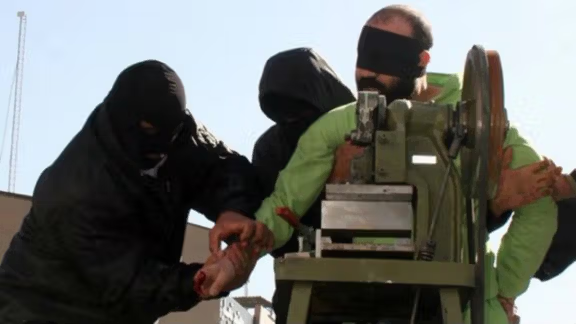
Iran’s judiciary has amputated the fingers of a 35-year-old man for allegedly stealing five sheep from a farm belonging to an IRGC member as the medieval practice gains pace.

Iran’s judiciary has amputated the fingers of a 35-year-old man for allegedly stealing five sheep from a farm belonging to an IRGC member as the medieval practice gains pace.
According to the Oslo-based Iran Human Rights Organization (IHRNGO), the amputation was carried out last July in the central prison of Iran’s religious city of Qom, the revelation showing a parallel rise in both executions and amputations over the last year.
“The amputation of a man’s fingers for stealing a few sheep by a corrupt system whose officials compete with each other in stealing and embezzling billions of dollars shows the extent of the Islamic Republic’s cruelty and immorality,” said IHRNGO Director Mahmood Amiry-Moghaddam.
According to the Abdorrahman Boroumand Centre, since January 2000, the Iranian authorities have amputated the fingers of at least 131 men, Amnesty International reported in 2022.
The latest victim, known only as Yousef, was working as a builder at the farm when he was arrested. “He denied the theft and insisted he was innocent throughout the 13 months he was behind bars,” IHRNGO quoted the source as saying.
Last month Ali Mozaffari, the Chief Justice of Qom Province, announced that the fingers of two prisoners who were sentenced to amputation for theft were cut off and warned more cases would follow, in spite of its contravening international law.
It comes as Iran's execution rates are also surging. Amid the worst national uprising since the founding of the Islamic Republic, crackdowns on dissent have seen record numbers of executions, the United Nations citing more than 800 in 2023 alone.
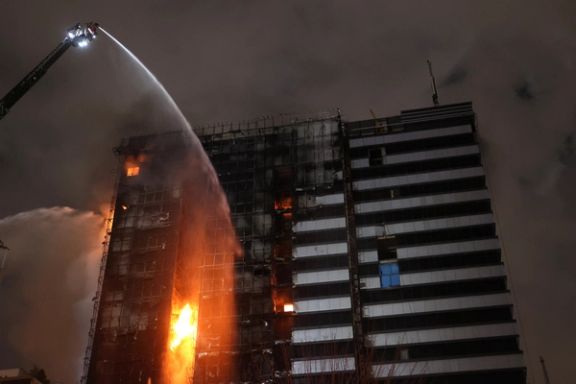
Tehran's Fire Department warned there are 18,000 “high-risk” buildings in the city, demanding the step-by-step implementation of safety measures for high-risk buildings.
“The existence of a significant number of unsafe buildings in Tehran and also the occurrence of such incidents as Plasco and Gandhi Hospital have raised concerns,” Jalal Maleki said.
The Plasco Building was a 20-story high-rise that collapsed in January 2017 after it caught fire. Twenty firefighters were reportedly killed and at least 70 others were injured by the collapse.
Last month, a huge fire broke out at the Gandhi Hospital in Tehran, which followed a warning from the Crisis Prevention and Management Organization of Tehran’s Municipality in December that the city does not have adequate infrastructure and safety measures in place for hospitals. And last June, five buildings that were under construction collapsed in southern Tehran, killing at least three people and injuring more than 10 others.
The new safety plan is intended to reduce the financial pressure on building owners and avoid business closures, but in the last two years, many have faced legal proceedings after lack of compliance with new measures.
After two warnings and a few months' deadline, further legal measures will be implemented, Maleki said.
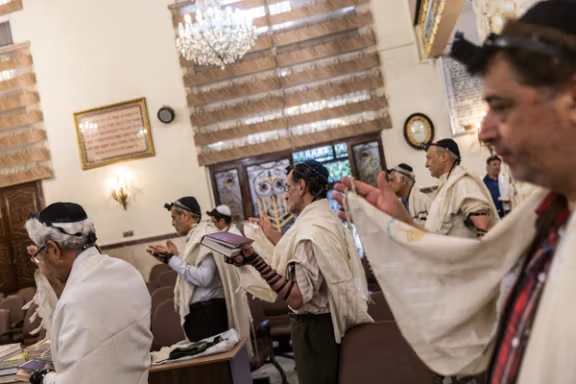
Iran’s Jews and non-Muslims have been forced to attend celebrations of the Islamic revolution as the regime continues to fight for credibility on the eve of upcoming elections.
On the Iranian Jewish community’s Telegram channel, the community wrote publicly about its "enthusiastic presence" at the event last month.
The event was attended by figures such as the head of Jewish community and representative in Iran’s pseudo parliament, Homayoun Sameach, and rabbis Arash Tehrani and Davis Sasani. An Armenian representative was present at the ceremony along with a Zoroastrian group, in addition to IRGC figures and commanders.
Alireza Nader, an Iranian-American expert on religious communities in Iran, told Iran International, “The regime treats Iran’s minorities terribly but wants to present a false image that they support the Islamic Republic through such events. Nothing can be further from the truth.”
Tehran-born Jew, Ben Sabti, who is a researcher in the Iran program at the Institute for National Security Studies, told Iran International that minorities are “hostages in the hands of the Iranian regime and they have to do anything that is needed to survive”.
At the time of the revolution in 1979, there were roughly 80,000 Jews living in Iran while today their numbers are between 5,000 to 8,000. The largest numbers have moved to Israel and the US.
Karmel Melamed, an LA-based Iranian-American Jew told Iran International, “It shouldn't surprise anyone that the mullah regime in Iran has paraded out Iran's Jews and other religious minorities from the country to supposedly honor the regime's Islamic revolution of 1979 because this has been their long standing propaganda tradition to do so.”
Melamed, who has written extensively on Iranian Jews, said that since the founding of the regime, the authorities have either paid off or used duress against religious minorities in Iran to have them participate in sham public events that promote the regime under a guise of religious pluralism. Officially, Iran only permits the three monotheistic religions but even the country's Sunni Muslim minority suffer extreme oppression.
Iranian law denies freedom of religion to large minority groups such as the Baha’is with ongoing arrests under sham security charges plaguing the community. Businesses have been forced to close and its community prohibited to register with universities, according to Human Rights Watch.
The government also discriminates against the country’s Azeri, Kurdish, Arab, and Baluch ethnic minorities with activists systematically arrested on sham charges.
In contrast to such public shows of support to the regime, Melamed explained that the country’s Jews and non-Muslims are treated “as third class citizens with limited to no rights and created an environment of extreme hostility, imprisonment or confiscation of their properties, to the point where the vast majority of non-Muslims in Iran have fled Iran since 1979 ... therefore they now resort to these events with religious minorities participating in order to keep up appearances of supposedly being wanted by the people of Iran.”
While Tehran continues to call for the destruction of Israel, the world’s only Jewish state, and amidst a proxy war being waged against Israel and its ally, the US, the country’s Jews are under deepened pressure.
Melamed said, “For anyone foolish enough to believe that this mullah regime in Iran is benevolent to the Jews of Iran and created a safe place for them to live in, just look at the numbers of Jews living in Iran today. The numbers don't lie."
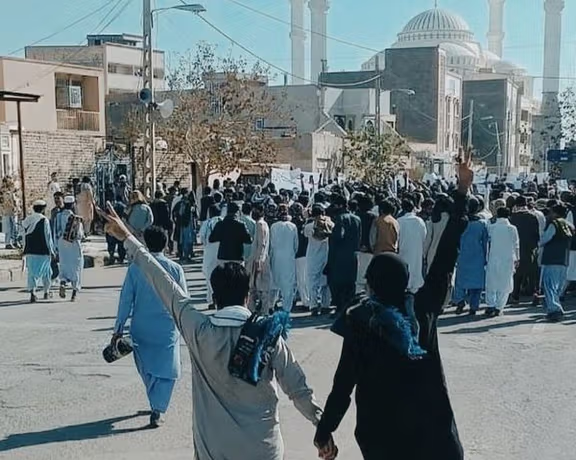
The first court session was held Wednesday for the trial of the security forces accused in the September 2022 massacre of peaceful protesters in Zahedan, Iran International can reveal.
Being held under Judge Mohammad Marzouyeh, the defendants are police officers accused of shooting protesters, all of whom are believed to be out on bail.
On September 30, 2022, security forces opened fire at peaceful protesters in Zahedan, the provincial capital of Sistan-Baluchestan, a day known as Bloody Friday amid the nationwide uprising dubbed Women, Life, Freedom.
The incident was the bloodiest during the nationwide uprising triggered by the death in morality-police custody of Mahsa Amini in 2022, resulting in the deaths of at least 105 civilians, including 17 children.
Holding the first court session 16 months after the massacre has surprised political and civil activists. Many view the trial as a desperate attempt by the Iranian regime to gain public trust and credibility in a bid to convince people to participate in the upcoming elections.
Activists said trying the police officers does not go far enough, calling for the commanders who ordered the killings to also be tried.
Since the massacre, weekly protests have continued in the province, Sistan-Baluchestan, one of Iran's poorest, a flashpoint of unrest since the uprising began.
In September, the Oslo-based Iran Human Rights Organization urged the international community to refer the massacre to international judicial bodies for investigation as crimes against humanity.
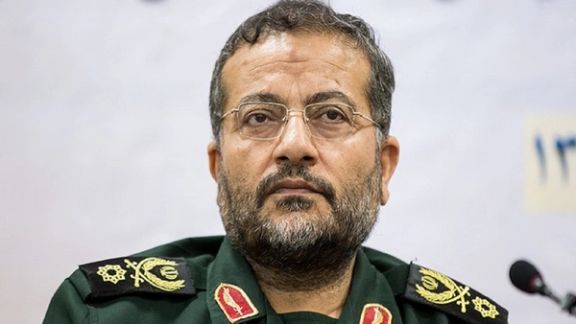
The commander of Iran’s Basij militia claims the ground has been prepared for Israel’s disappearance, as the regime's proxies around the region continue attacks on the Jewish state and its ally, the US.
"The biggest media giants are Jews; they know that the Islamic Republic of Iran has targeted the existence of the Zionist regime, and the groundwork for its eradication has been laid," Gholamreza Soleimani stated during a public gathering.
The statement comes after Iran vowed its proxy groups will rally around the Palestinian Hamas and eventually defeat Israel. However, the Iranian regime has stayed out of the Gaza war as Israel has vowed to dismantle Hamas.
Iran-backed Hamas has since been supported by Iran’s proxies in Iraq, Syria, Lebanon and Yemen who have attacked Israel from its northern border and Red Sea coast, and US facilities across the region, punishment for Biden's support for Israel's right to defend itself in the wake of the October atrocities.
Soleimani has repeatedly vocalized the regime's sentiments towards Israel as money is poured into overseas proxies in the war on Israel and the US, a justification of the misplaced budget priorities as the country suffers its worst economic crisis since the founding of the Islamic Republic.
In 2015, Supreme Leader Ali Khamenei, who founded the proxy militias as a strategy to eliminate its archenemy, said the Jewish state must be destroyed in 25 years.
The government set up a countdown clock in Tehran and other cities to mark the journey, a gesture mocked by many Iranians.
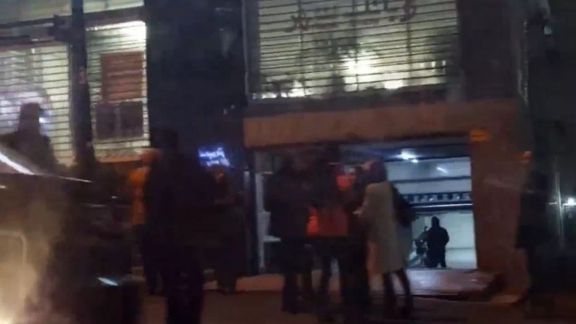
Iranian media and observers say the detention of journalists at a liberal-leaning media office might be linked to a recent revelation about Iran's international clandestine fund transfers.
On Monday evening, security forces raided the offices of Farda-ye Eghtesad, an economic website, and detained 30 journalists, including senior editors, holding them incommunicado inside the building overnight. They also confiscated all office computers and electronic devices including mobile phones and interrogated the staff. Additionally, the arrest of another economic journalist, Mehdi Afsharnik, was announced, apparently connected to the raid on Farda-ye Eghtesad.
The website, launched in August 2023, is owned by a subsidiary of Kian Capital, a private investment firm. The newspaper’s offices along with the company’s headquarters and its subsidiaries, were also raided, all located in the same building.
Journalists and observers in Tehran do not say what kind of links exist between the website and Kian capital on the one hand and the issue of circumventing sanctions on the other. It is assumed that the website at least was somehow involved in revealing the Iranian government’s illicit activities.
Kian Capital’s ties with businessman turned political activist Majid Zamani, who founded Kian Group, are noteworthy. Zamani, who now resides in Britain after leaving Iran during last year’s anti-government protests, founded a political group named Government for Iran, advocating for political dialogue and a transition from the Islamic Republic.The group has explained its principles and goals in a document entitled “Roadmap to a Dream” on the English page of its website.
The judiciary’s official news agency, Mizan, released a statement on Tuesday, asserting that the raid and journalist's arrest were not linked to journalistic activities but were under investigation by a security agency. While some detainees have been released, senior editor Ali Mirzakhani and journalist Behzad Bahmannejad have reportedly been taken to another location by security forces.
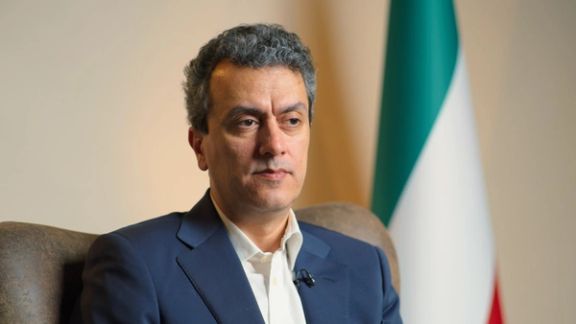
An economic expert in Tehran, speaking anonymously to Iran International, suggested that the security operations may be in response to a Financial Times report on an Iranian company evading sanctions and the Iranian Navy's seizure of an oil tanker linked to the US in January. The affiliation of Farda-ye Eghtesad with Kian Capital and its founder, Majid Zamani, is considered significant in this context, but no one offers a concrete explanation.
Zamani, an active member of the reformist Mir-Hossein Mousavi’s campaign, was arrested in 2009 for several months during the Green Movement.
Speaking to the reformist Ensaf News Wednesday, the London-based Zamani said that security forces had raided Mabna, a subsidiary of Kian Capital last week, and held all the staff for 24 hours and interrogated them.
According to Zamani, the investigation was related to a video file about sanctions that had been uploaded from one of IP addresses of Mabna on Instagram. He claimed that no evidence had been found during the raid.
Zamani also spoke about more raids on his former companies this week. “They entered the central building of the Kian Group, which is at another location and started inspecting all the [subsidiary] companies for the same reason,” he said and added that the employees had been questioned about having contacts with him.
“[The offices of] Farda-ye Eghtesad are in the same building where other Kian Group companies are. Consequently, [the newspaper office and staff] were searched and interrogated, too,” he told Ensaf News.
Zamani also said he has no knowledge of the video about sanctions that security forces have been questioning the company staff and journalists about.